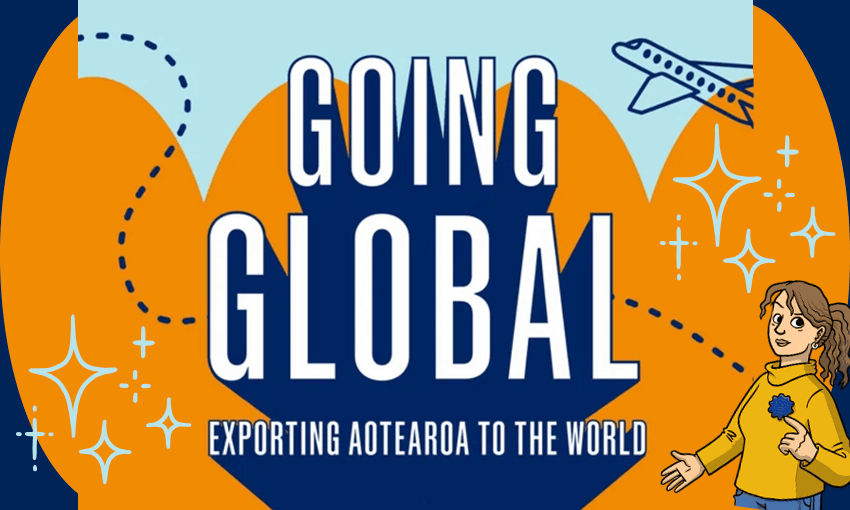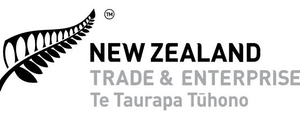Our export industry isn’t just dairy and meat any more – as demonstrated by these five business owners doing export differently.
The term “exporting” often connotes something physical; stock – often originating in New Zealand’s primary industries – shipped from our shores to reach lucrative international markets. But as the internet and other technological developments have changed the way we live, the number of products (and, increasingly, services) that can be exported has expanded exponentially.
Now an online news brand, digital classroom software and a financial learning platform can be just as much a part of our export market as clothing and FMCG brands. We spoke with six contemporary founders about their own journeys to export products both physical and digital on Going Global, a podcast series created in partnership with NZTE.
Hosted by Business is Boring‘s Simon Pound alongside Brianne West, founder and CEO of eco-friendly cosmetics company Ethique (which exports to 22 countries globally), the first season of Going Global has now wrapped up. In case you missed it, we’ve put together a helpful recap of the kōrero from throughout the season.
Find Going Global in the Business is Boring feed on Spotify, Apple Podcasts and anywhere else you listen to podcasts.
Laura Bell, Safestack Academy
Starting out as a security consultancy, Safestack Academy now provides training to some of Australasia’s biggest and most trust-reliant companies. ASB, Trade Me, Sky and Layby all use its services, allowing them to build high-quality security software of their own.
Founder Laura Bell has created a product that is scalable, easily accessible from anywhere in the world, and is a weightless export.
“The way [businesses] do security sucks,” says Bell on the podcast. “We go really fast when we build companies and when we build software, but security at that point in time was going at a glacial rate, and [I thought] I can do that differently, so that’s what I did.”
Realising there was a gap in the market for easy, fast security training, and noticing a steady decline in consultancy customers due to Covid-19, Bell decided to create the Safestack Academy. The company provides courses and qualifications from beginner to advanced level, and hands-on labs for training. They’ve also created a community for people from across the globe to talk and anonymously create solutions to security issues.
“Our first overseas customer was an absolute accident. I spoke at a conference, I met somebody afterwards, it was lovely. I don’t even really remember their name, and then two weeks later I had an email going, ‘Hi, we want to buy’… a lot of our early global export stuff was opportunistic or relationship based.”
Now, Safestack Academy’s global success has led them into 35 countries and they’re still growing.
Learn more about Laura Bell’s exporting journey with Safestack Academy:
Karen Walker, fashion designer
Karen Walker is a name synonymous with New Zealand fashion. Over more than 30 years, Walker has built an international reputation for clever design, adventurous collaborations, imaginative storytelling and constantly refining her approach to retail.
She’s spent years showing at international fashion weeks, partnering with other top global brands, and launching export-friendly products like sunglasses, perfume and jewellery.
Walker has had an eye for the export market since first starting her business decades ago, and has grown into one of our most successful fashion exporters.
“New Zealand is only so big, so if we wanted to grow our business it made more sense to be a global niche product than a mass-market local… We saw what it was like [internationally], what fashion and culture and creativity were like and thought we wanted to be part of that type of thinking and that type of community,” says Walker.
Hear more from Karen Walker about taking her fashion brand to the world:
Rachel Taulelei, Oho
Rachel Taulelei (Ngāti Raukawa ki te Tonga, Ngāti Rārua, Ngāti Koata) is a Māori business leader and co-founder of design and brand strategy firm Oho.
Taulelei founded sustainable fishery Yellow Brick Road and was CEO of food and beverage company Kono, which exports to more than 40 countries worldwide.
Now, with Oho, she helps businesses find and tell their unique stories with an eye to the world. Taulelei has seen exporting from all sides, having previously been New Zealand’s trade commissioner in Los Angeles, so understands the export market better than most.
“If you really want to succeed in export, you need to be in market. You’ve just got to be there, you’ve got to live it, you’ve got to breathe it.”
Taulelei’s connection to her Māoritanga has helped give her a unique perspective on creating businesses and evaluating their success.
“We are a Māori business built on intergenerational vision and strength and resilience that made us growers, orchardists, fishermen and farmers,” she says. “We have the amazing privilege of packaging those products and imbuing them with Māori imagery and taking our Māori stories to the world.”
Learn more about Rachel Taulelei’s international journey:
Lucy Blakiston, Shit You Should Care About
Lucy Blakiston is the co-founder and CEO of Shit You Should Care About (SYSCA), a global news brand that’s amassed over 3.6 million social media followers in under four years.
Blakiston is an unlikely exporter, but her brand is undeniably international. SYSCA is known best for digesting the biggest news stories in the world and giving them context relevant to their young audience through podcasts, a daily newsletter and their social media channels.
It was over the first year of the pandemic that SYSCA’s following began to boom, and within a few months Blakiston and her two co-founders were running an international brand.
“In 2020, people were stuck inside on their phones. They were hungry for information, they were mystified and we were there ready to help them. We didn’t make any money at this stage but we were doing the world a service and giving the young people that read our stuff a service.”
Hear more from Lucy Blakiston on creating an internationally successful media brand:
Alliv Samson, Kami
Over the last 10 years, the capacity for digital education has been growing in schools across the world – students are now often expected to bring their own devices to work from and more learning is taking place over the internet. But it was the last couple of years, as the pandemic advanced all over the world, when remote learning became a necessary reality for millions.
Alliv Samson is the COO and co-founder of Kami, a digital education provider used by over 32 million people worldwide, and named by Time Magazine as one of the top 100 most influential companies in the world.
Samson’s experience in computer science has helped shape Kami into one of the world’s fastest growing edtech companies, allowing teachers and students to view, edit and collaborate easily. Their largest market is North America, and Samson says the Kami team have always had a vision to be a massive global player.
“[During our first year] we tried doing it locally and that didn’t work for us…. We could have immediately [gone] to the US and grown even faster than we were,” Samson says. “We should have gone big on day one.”
“We started focusing on American schools, what they do and what they need and what the teachers are doing in a day – trying to understand small details into the market that we’re trying to target. That helped us have this good direction in terms of exporting.”
Hear more from Alliv Samson about riding the international edtech wave with Kami:
Kendall Flutey, Banqer
In a bid to increase financial literacy and confidence among young people, Kendall Flutey (Ngāi Tahu, Ngāti Kahungunu) co-founded financial education platform Banqer, where she is now the co-CEO.
Banqer is used by over 300,000 students in Australasia, from primary age all the way through high school, to learn how to budget, explore career paths, understand investing and get a handle on financial concepts like income tax and superannuation.
Flutey, who describes herself as a “reformed accountant”, wants to encourage financial literacy and confidence among young people to empower their futures – something she doesn’t think she was taught enough of at school.
“We have two interactive simulative platforms where kids can get their hands dirty pretending to be adults managing their finances,” she says of Banqer. “So it can be as simple as a mock bank account and they may be investing on our fictitious stock exchange but it all feels really real.”
Hear more from Kendall Flutey about growing a business aimed at school students.
Why all the women?
You may not have noticed, but in this series we only interviewed women leaders. That’s because while there are so many awesome wāhine in Aotearoa, they’re still very underrepresented in exporting. In the words of Going Global’s Brianne West, “that’s bananas”.
NZTE wants to change that, by celebrating more success stories and removing some of the barriers that women face when trying to scale their businesses globally. If you’d like to learn more, head to getthere.nz/women.

